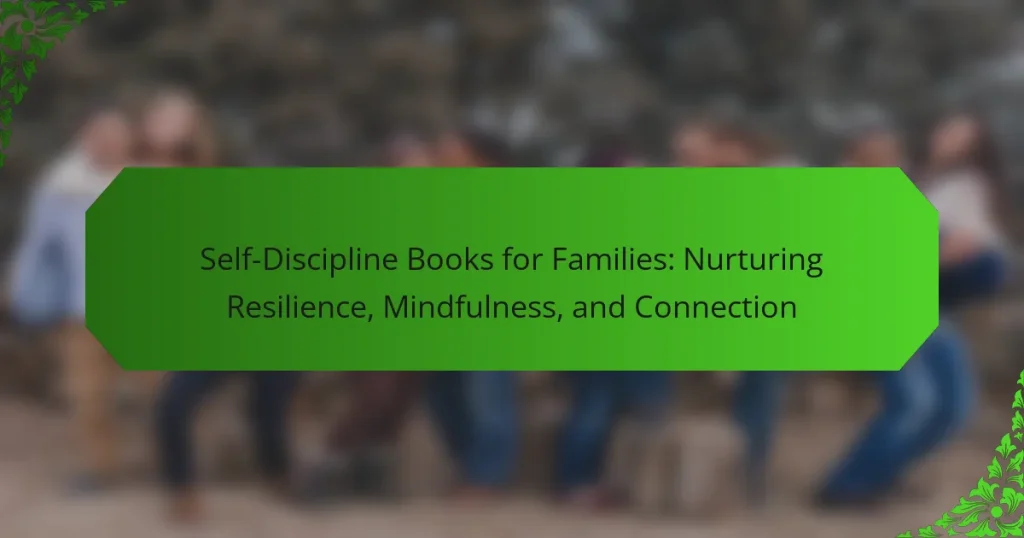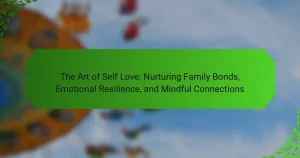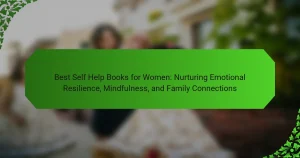Self-discipline books for families provide practical strategies to enhance resilience, promote mindfulness, and strengthen connections. Key principles include setting clear expectations, modeling behaviour, fostering open communication, and encouraging accountability. These approaches help families navigate challenges together while cultivating self-control and emotional regulation. Seeking diverse perspectives in literature enriches understanding and engagement, making self-discipline more relatable for various family dynamics.
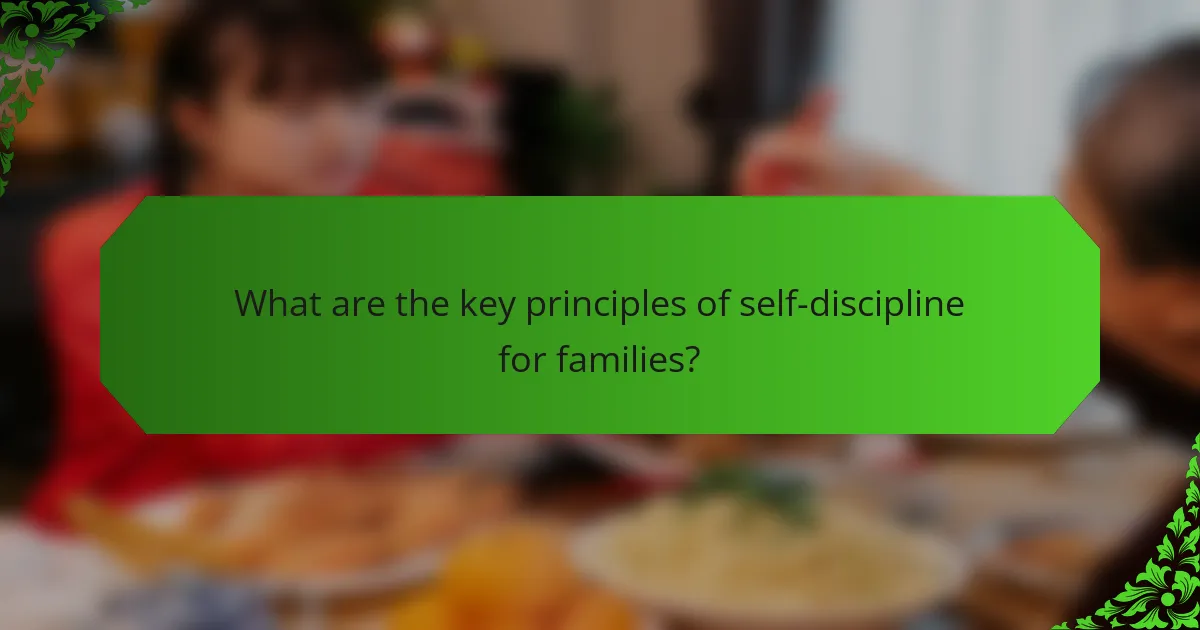
What are the key principles of self-discipline for families?
Self-discipline for families involves consistent practices that foster resilience, mindfulness, and connection. Key principles include setting clear expectations, modeling behaviour, fostering open communication, and encouraging accountability. These practices create a supportive environment that nurtures self-discipline in children.
1. Set clear expectations: Define family rules and responsibilities to guide behaviour.
2. Model behaviour: Parents should demonstrate self-discipline, as children learn through observation.
3. Foster open communication: Encourage discussions about challenges and successes to strengthen connections.
4. Encourage accountability: Teach children to take responsibility for their actions, promoting growth and resilience.
How does self-discipline impact family dynamics?
Self-discipline positively influences family dynamics by fostering resilience, mindfulness, and connection. Families that practice self-discipline experience improved communication and stronger relationships. For example, consistent routines enhance stability, allowing members to support each other effectively. This collective effort nurtures a sense of belonging and accountability, essential for emotional growth. Furthermore, self-discipline encourages individuals to model positive behaviours, creating a nurturing environment that reinforces family values.
What role does resilience play in self-discipline?
Resilience significantly enhances self-discipline by fostering perseverance in the face of challenges. It enables individuals to maintain focus on their goals despite setbacks. Resilience encourages adaptive coping strategies, allowing families to support one another in cultivating self-discipline. This nurturing environment strengthens connections and promotes mindfulness, leading to improved overall well-being.
How can families cultivate resilience together?
Families can cultivate resilience together by engaging in shared activities that promote mindfulness and self-discipline. Reading self-discipline books as a family fosters open discussions about challenges and strategies. This practice enhances emotional intelligence, strengthens family bonds, and encourages a supportive environment. Regularly practicing mindfulness techniques, such as meditation or deep-breathing exercises, can further build resilience. Engaging in these activities consistently nurtures a culture of connection and growth within the family unit.
What mindfulness techniques enhance self-discipline?
Mindfulness techniques that enhance self-discipline include meditation, breath awareness, and mindful journaling. These practices cultivate focus and emotional regulation, essential for maintaining self-discipline. Regular meditation can improve attention span, while breath awareness helps manage stress responses. Mindful journaling encourages reflection on behaviours and goals, fostering accountability. Families can implement these techniques together, nurturing resilience and connection.
Which mindfulness practices are effective for families?
Mindfulness practices effective for families include meditation, mindful breathing, and gratitude journaling. These techniques foster resilience and strengthen family connections. Regular family meditation sessions can enhance emotional awareness. Mindful breathing exercises help manage stress collectively. Gratitude journaling encourages appreciation and positivity within the family dynamic.
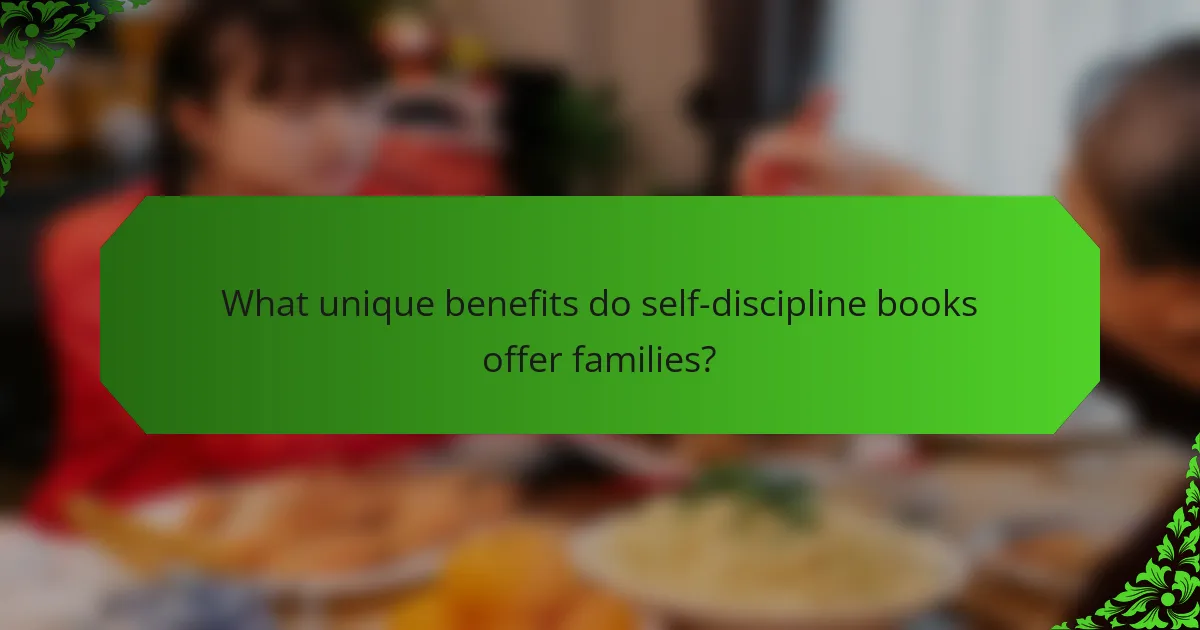
What unique benefits do self-discipline books offer families?
Self-discipline books offer families unique benefits by enhancing resilience, promoting mindfulness, and strengthening connections. These books provide practical strategies that help family members cultivate self-control and emotional regulation. As a result, families can navigate challenges together, fostering a supportive environment. Additionally, the insights gained from these books encourage open communication, leading to deeper relationships among family members.
How can these books foster deeper connections among family members?
Self-discipline books can significantly enhance family connections by promoting shared values and practices. They foster resilience through collaborative goal-setting, encouraging family members to support one another. Mindfulness techniques presented in these books create a space for open communication, allowing family members to express feelings and thoughts. Engaging with these texts together cultivates a sense of unity, as families learn to navigate challenges and celebrate successes collectively. This shared journey not only strengthens bonds but also instills a deeper understanding of each other’s perspectives and needs.
What are the best self-discipline books tailored for families?
“Self-discipline books for families focus on building resilience, mindfulness, and connection. Notable titles include ‘The Whole-Brain Child’ by Daniel J. Siegel, which emphasizes emotional intelligence, and ‘Raising An Emotionally Intelligent Child’ by John Gottman, which teaches parents to guide their children’s emotional development. Another recommended book is ‘Mindset: The New Psychology of Success’ by Carol S. Dweck, which encourages a growth mindset in children. ‘How to Talk So Kids Will Listen & Listen So Kids Will Talk’ by Adele Faber and Elaine Mazlish offers practical communication strategies. Lastly, ‘The 7 Habits of Highly Effective Families’ by Stephen R. Covey provides a framework for family success.”
Which authors are renowned for their contributions in this area?
Renowned authors in self-discipline for families include Daniel J. Siegel, who emphasizes mindfulness, and Angela Duckworth, known for her work on grit. Other notable figures are Brené Brown, focusing on connection, and Jon Kabat-Zinn, who teaches mindfulness practices. Each contributes unique insights into nurturing resilience and emotional well-being within families.
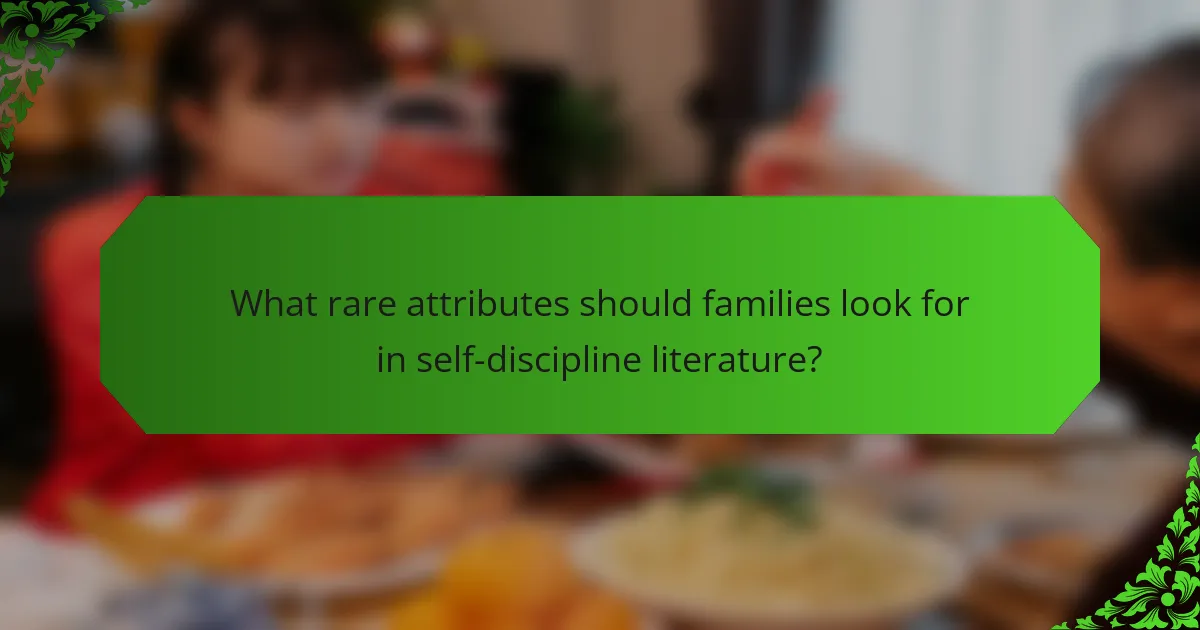
What rare attributes should families look for in self-discipline literature?
Families should seek rare attributes like practical applications, interdisciplinary approaches, and culturally diverse perspectives in self-discipline literature. These elements enhance understanding and relatability, fostering deeper engagement. Practical applications provide actionable strategies, while interdisciplinary approaches integrate psychology, education, and parenting, enriching the learning experience. Culturally diverse perspectives ensure inclusivity, making the content relevant to various family dynamics.
How do cultural perspectives influence self-discipline approaches?
Cultural perspectives significantly shape self-discipline approaches by influencing values, practices, and family dynamics. For instance, collectivist cultures emphasize communal goals, fostering resilience through shared responsibility. In contrast, individualistic cultures prioritise personal achievement, promoting mindfulness as a tool for self-regulation. These differences affect how families engage with self-discipline books, impacting their effectiveness. Understanding these cultural nuances enhances the connection between parents and children, nurturing a supportive environment for developing self-discipline.
What innovative formats are available for self-discipline books?
Self-discipline books for families are available in various innovative formats. These include interactive workbooks that engage readers through exercises, audiobooks that allow for on-the-go learning, and online courses that offer multimedia resources. Additionally, some titles are presented as podcasts, blending storytelling with practical advice. Graphic novels and illustrated guides provide visual storytelling to enhance engagement. Finally, mobile apps based on these books create an interactive experience, allowing families to track progress and set goals together.
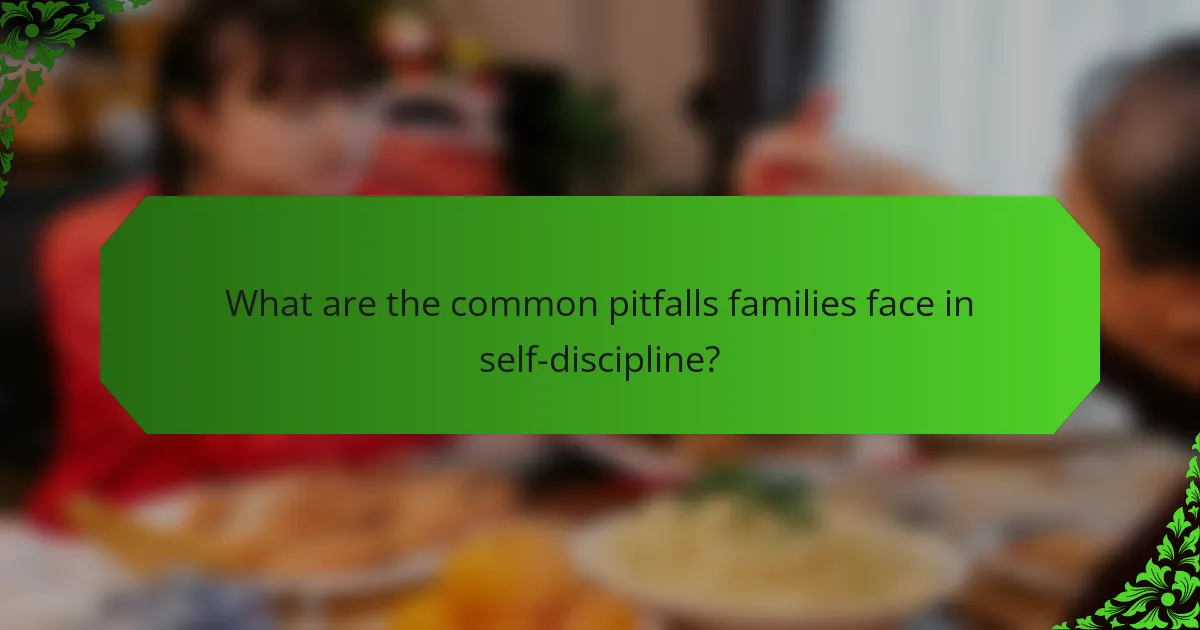
What are the common pitfalls families face in self-discipline?
Families often struggle with inconsistency, unrealistic expectations, and lack of communication in self-discipline. These pitfalls hinder the development of resilience and mindfulness. Establishing clear goals and fostering open dialogue can mitigate these challenges. Prioritising emotional support strengthens family connections, enhancing self-discipline efforts.
How can families avoid these mistakes?
Families can avoid mistakes by prioritising open communication, setting clear expectations, and modeling self-discipline. Establish regular family meetings to discuss goals and challenges. Encourage each member to express their feelings and experiences. Implementing a consistent routine fosters resilience and mindfulness. Use self-discipline books as tools for learning and discussion, reinforcing the connection among family members.
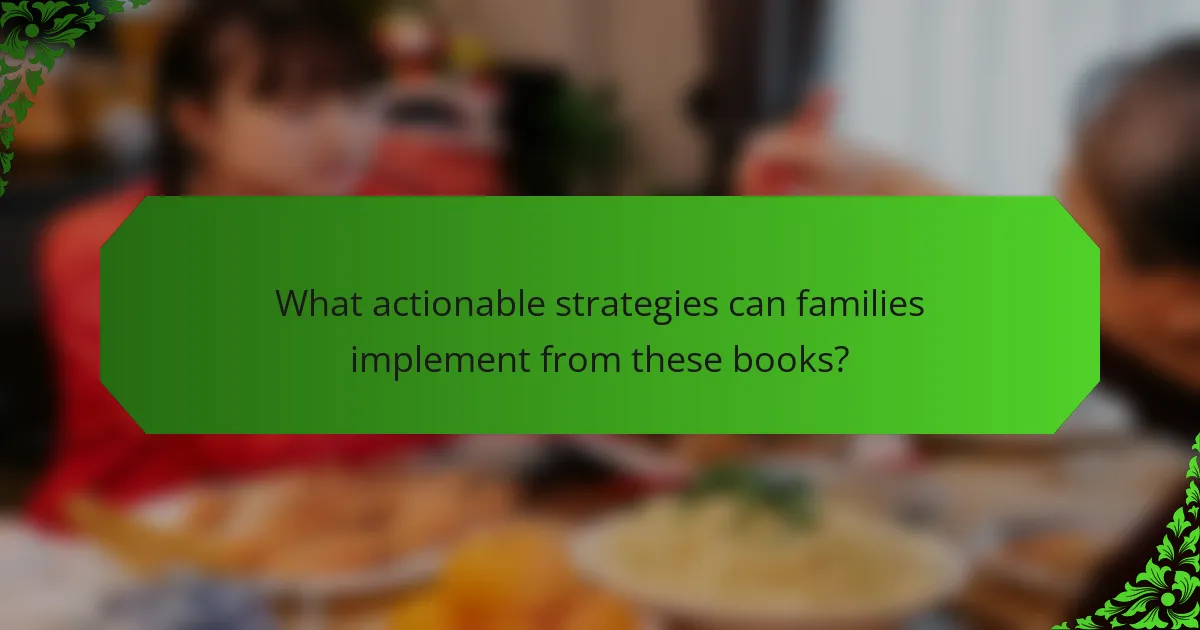
What actionable strategies can families implement from these books?
Families can implement actionable strategies from self-discipline books by fostering open communication, setting shared goals, and practicing mindfulness together. Establishing a routine that includes family discussions about emotions and challenges enhances resilience. Engaging in activities that promote connection, such as collaborative problem-solving tasks, builds trust and understanding. Regularly reflecting on progress as a family strengthens commitment to self-discipline practices.
How can families create a self-discipline plan together?
To create a self-discipline plan together, families should establish clear goals, set consistent routines, and encourage open communication. Start by discussing individual and collective expectations. Incorporate self-discipline books that focus on resilience, mindfulness, and connection to guide discussions and activities. Regularly review progress and celebrate achievements to reinforce positive behaviours.
What steps should be included in this plan?
To create a comprehensive plan for “Self Discipline Books for Families,” include the following steps:
1. Identify family goals related to self-discipline.
2. Research and select appropriate books that emphasize resilience, mindfulness, and connection.
3. Create a reading schedule that encourages consistent engagement.
4. Establish discussion points to facilitate family conversations about the content.
5. Implement practical exercises and activities inspired by the books.
6. Review progress regularly and adjust the plan as needed.
What expert insights can enhance family self-discipline practices?
Expert insights can enhance family self-discipline practices by emphasizing resilience, mindfulness, and connection. Effective self-discipline books provide strategies for nurturing these qualities. For instance, books that focus on emotional intelligence can help families understand and manage emotions, fostering a supportive environment. Additionally, incorporating mindfulness practices encourages present-moment awareness, which strengthens family bonds. Research indicates that families who engage in shared reading experiences develop better communication skills, enhancing overall discipline. Ultimately, selecting literature that aligns with family values can cultivate a culture of self-discipline and mutual respect.
